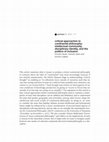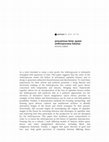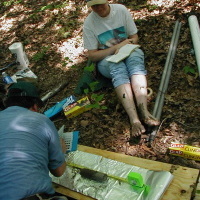Papers by Briohny Walker

Journal of Homosexuality, Jan 25, 2021
ABSTRACT International emergency management and disaster risk reduction policies and planning hav... more ABSTRACT International emergency management and disaster risk reduction policies and planning have rarely included lesbian, gay, bisexual, transgender, intersex, and queer (LGBTIQ) people’s specific health and wellbeing concerns, despite increasing research showing that these groups face some specific vulnerabilities and additional challenges. Emerging studies in the US and UK noted increased feelings of loneliness, minority stress, and vulnerability to family violence since the outbreak of COVID-19. However, little is known about LGBTIQ people’s experiences of COVID-19 in Australia. This article explores the effects of COVID-19 on LGBTIQ mental health and wellbeing in Tasmania, Australia. Drawing on a survey of 231 LGBTIQ respondents aged 14–78, we use the spaces of wellbeing framework to examine the impacts of COVID-19 restrictions on LGBTIQ (in)visibility in relation to the public, private, and online spaces, arguing that COVID-19 restrictions affected LGBTIQ Tasmanians’ experiences and use of spaces in ways that detracted from wellbeing, visibility, and belonging.

Australian Geographer, Oct 2, 2021
ABSTRACT Rural areas have long been represented as unwelcoming to lesbian, gay, bisexual, transge... more ABSTRACT Rural areas have long been represented as unwelcoming to lesbian, gay, bisexual, transgender, and queer (LGBTQ) communities. However, demographic trends show that lesbians are more likely than gay men to live in rural Australia, especially as they age. Despite this, little is known about lesbians’ motivations for living in these areas, how they experience rural communities, or what aspects of rural places support positive ageing for this group. Lesbian and feminist geographies highlight how lesbians have often cultivated socio-political links with the natural world. Building on this work, in this article we explore how older lesbians experience place-based belonging in rural communities and the role of more-than-human actors in fostering a sense of home. Through in-depth interviews with 13 women over 55 and participant-produced photography, we identified three overarching themes: (1) More-than-human Community; (2) Gardening as Placemaking and Community Building;(3) Belonging and Acknowledging Risk. In contrast with notions of lesbians as being ‘out of place’ in rural communities, we argue that belonging is established both through human and more-than-human kinships formed in rural places. By visually representing their lives in rural communities, our participants challenged the invisibility of older lesbians and demonstrated how the rural can offer rich possibilities for multi-species futures.

This article examines what it means to produce critical continental philosophy in contexts where ... more This article examines what it means to produce critical continental philosophy in contexts where the label of "continental" may seem increasingly tenuous, if not entirely anachronistic. We follow Ghassan Hage in understanding "critical thought" as enabling us "to reflexively move outside of ourselves such that we can start seeing ourselves in ways we could not have possibly seen ourselves, our culture or our society before." Such thought may involve an interrogation of our own conditions of knowledge production, by giving us "access to forces that are outside of us but that are acting on us causally." Our argument in this article is that critical approaches within continental philosophy need to examine a multiplicity of ways that disciplines can be defined and delimited, and to understand the ways that gender, geography, and coloniality (among other forces) shape the intellectual and social worlds of continental philosophy. In doing so, we wan...
Health & Social Care in the Community

Parrhesia, 2019
As a term intended to name a new epoch, the Anthropocene is intimately entangled with questions o... more As a term intended to name a new epoch, the Anthropocene is intimately entangled with questions of time. This paper suggests that the onset of the Anthropocene marks the failure of anticipated capitalist futures, and in doing so generates subjective futurelessness and disorientation. To read these experiences for their ethical and political potential, I bring Marxist and decolonial readings of the Anthropocene into contact with queer theory concerned with temporality and futurity. Bringing these frameworks together allows for an interpretation of the loss of capitalist futures within the Anthropocene and positions this as a political opportunity for the elevation of alternative future imaginaries. Queer theory provides an example of how failure and futurelessness can be read as rich with political possibility. Further, it demonstrates methods for locating, interpreting and drawing upon diverse cultural and intellectual archives to identify alternative images of the future and clarify strategies for their pursuit. Structurally, this account begins by investigating the origins of capitalist images of the future by reviewing histories and ideologies of capitalist time and exploring how they participate in the production of, and are disrupted by, the Anthropocene. This paper then mobilises queer temporalities in order to re-vision the Anthropocene as the failure of capitalist reproduction. Framing this as a refusal, I seek differing models of futurity within queer theory and other marginalised discourses, including Black and Indigenous futurisms. Finally, I suggest that queer theories of grief and loss may help guide processes of transition between differing future
Continuum Journal of Media & Cultural Studies, 2018
This article is an autoethnography of two free education projects, Brisbane Free University and Q... more This article is an autoethnography of two free education projects, Brisbane Free University and Queering Health Hobart. We suggest that in theorizing our experiences of these sites through feminist theories of care, we see how counter-capitalist and anti-oppressive cultures might be fostered within and against neoliberal capitalism. In particular, we suggest that these spaces foster forms of relationality, locatedness and attentiveness which disrupt the (re) production of neoliberal logics. By attending to one another in the specific conditions of the 'here and now', we begin to prefigure counter-capitalist cultures of care.
Journal Articles by Briohny Walker
Parrhesia: A Journal of Critical Philosophy., 2019











Uploads
Papers by Briohny Walker
Journal Articles by Briohny Walker